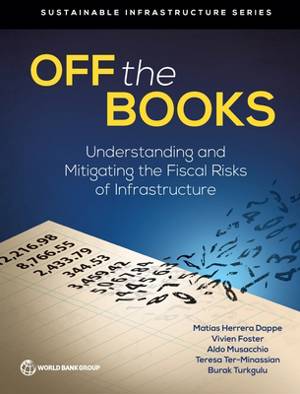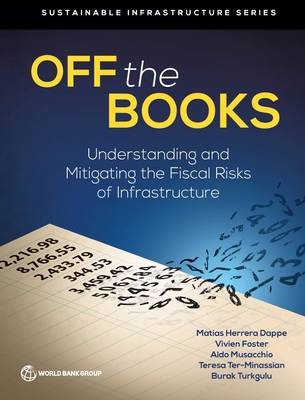
Door een staking bij bpost kan je online bestelling op dit moment iets langer onderweg zijn dan voorzien. Dringend iets nodig? Onze winkels ontvangen jou met open armen!
- Afhalen na 1 uur in een winkel met voorraad
- Gratis thuislevering in België vanaf € 30
- Ruim aanbod met 7 miljoen producten
Door een staking bij bpost kan je online bestelling op dit moment iets langer onderweg zijn dan voorzien. Dringend iets nodig? Onze winkels ontvangen jou met open armen!
- Afhalen na 1 uur in een winkel met voorraad
- Gratis thuislevering in België vanaf € 30
- Ruim aanbod met 7 miljoen producten
Zoeken
Off the Books
Understanding and Mitigating the Fiscal Risks of Infrastructure
Matías Herrera Dappe, Vivien Foster, Aldo Musacchio
Paperback | Engels
€ 65,45
+ 130 punten
Omschrijving
Developing countries face massive infrastructure needs, but public spending on infrastructure is inadequate, and public investment has been declining in recent years. Rising debt levels and tightening fiscal and monetary conditions are putting further pressure on the funds available for infrastructure, heightening the importance of increasing the efficiency of infrastructure spending. Off the Books: Understanding and Mitigating the Fiscal Risks of Infrastructure shows that however governments deliver infrastructure-through direct public provision, state-owned enterprises (SOEs), or public-private partnerships (PPPs), the risk of fiscal surprises is high in both good times and bad. As a result, infrastructure service delivery often ends up costing significantly more than expected, eroding limited fiscal space for productive spending. This book makes a unique contribution by quantifying the magnitude and prevalence of fiscal risks from electricity and transport infrastructure and identifying their root causes across a range of low- and middle-income countries. Drawing on important new sources of evidence and compiling many others, the analysis sheds light on how much is at stake in the good governance of infrastructure sectors. It allows policy makers to weigh the magnitudes of different types of risks and examine how they vary across contexts. Off the Books shows how a deeper understanding of the fiscal risks of infrastructure can help policy makers target reforms to areas where they can be expected to have the greatest impact. It lays out a reform agenda for mitigating the fiscal risks associated with infrastructure based on building government capacity; adopting integrated public investment management and integrated fiscal risk management; improving fiscal and corporate governance of SOEs; and ensuring robust PPP preparation, procurement, and contract management. The book will be of enormous value to policy makers, practitioners, and academics who have an interest in infrastructure and fiscal policy.
Specificaties
Betrokkenen
- Auteur(s):
- Uitgeverij:
Inhoud
- Aantal bladzijden:
- 180
- Taal:
- Engels
Eigenschappen
- Productcode (EAN):
- 9781464819377
- Verschijningsdatum:
- 27/03/2023
- Uitvoering:
- Paperback
- Formaat:
- Trade paperback (VS)
- Afmetingen:
- 203 mm x 267 mm
- Gewicht:
- 521 g

Alleen bij Standaard Boekhandel
+ 130 punten op je klantenkaart van Standaard Boekhandel
Beoordelingen
We publiceren alleen reviews die voldoen aan de voorwaarden voor reviews. Bekijk onze voorwaarden voor reviews.











